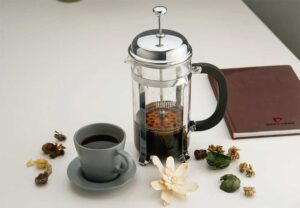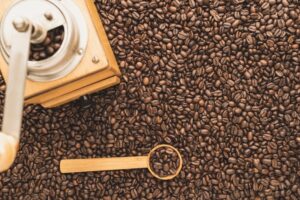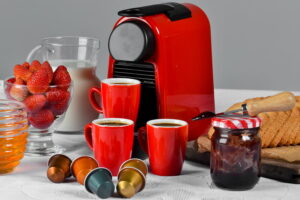Cold brew coffee is fast becoming a great coffee option. It’s an energy booster, easy to make, and refreshing. However, after your first sip, you may be disappointed your brew has a bitter taste. You can easily fix that if you know how to make cold brew less bitter.
Contents
How to Make Cold Brew Less Bitter
Your cold brew may taste rancid or bitter due to specific reasons. It could be the subpar quality of your coffee beans or even dirty coffee equipment, among other reasons. However, the upside is that it’s easy to navigate around these problems. Here are common solutions:
Steep the Cold Brew for a Shorter Time
A bitter brew can be a consequence of over-extraction. So to solve this problem, shorten the brew time by letting it steep for less than a day. The shorter the time your coffee brews for, the less extraction that occurs.

You can brew your coffee for 12 hours instead and taste it afterward. If you’re not satisfied with the taste, brew it for 2 hours more. You can do this as many times as you need to until you achieve the perfect balance.
Brew Longer
For under-extracted coffee, your coffee isn’t extracted enough. There are various ways to deal with this and you can experiment as you wish:
- First, brew your grounds longer by allowing the water to dissolve and extract all the flavors. However, not too long so you don’t experience over-extraction.
- Second, adjust the water temperature. There’s a good chance your water is just passing through the grounds without extracting the flavors if it isn’t hot enough. The hotter the water, the more successful the flavor extraction. It’s advisable to maintain the water at 195 to 205 degrees Fahrenheit.
In the case where these two solutions don’t work, change the brewing method. If you’ve been brewing via steeping/immersion with a French press, coffee bags, or vacuum pots, you can try brewing using pressure with an espresso machine or a Moka Pot.
Use Better Water
The importance of water in coffee cannot be overemphasized; Coffee is 98% water. If your water is bad, your coffee will taste bad. In lieu of regular tap water, try using distilled or filtered water. It optimizes your brew quality and yields better results.
Additionally, coffee is brewed better with soft water instead of hard water. The latter has high mineral content that affects coffee flavors while the former is better because it contains fewer minerals.
If you have everything ticked off on the list and you still have a bitter beverage, opt for more water when brewing. More water could pull out all the flavors.
Opt for a Consistent Grind
Your brew may be sour because your ground is too coarse. In this case of under extraction, your ground size may be too rough and the water will seep through the grounds without extracting properly. To remedy this, use a more consistent and medium grind.
Alternatively, if your beverage is bitter and your grounds are over-extracted, grind finer to eliminate the extra flavors and organic components.
What Causes a Bitter Brew?
Making a cold brew less bitter is a relatively easy task. However, before you proceed to make the necessary adjustments, it’s imperative to know why your cold brew is bitter as well as the difference between a bitter brew and a sour brew.

Over Extraction
To comprehend the concept of over-extraction, you must first have the complete idea of extraction. Extraction is also known as brewing coffee and it goes beyond fresh ground coffee beans and hot water. When the elements of ground coffee, including flavor, oils, and sugar are dissolved into a mug, extraction has occurred.
During this process, extracting the right blend of coffee flavors and organic substances is pivotal to brewing coffee. Consequently, over-extraction occurs when your coffee grounds absorb extra organic compounds because it was immersed in water for an extended period. As a result, the organic elements overload the cup with a bitter flavor.
In simpler terms, the flavor is determined by the extraction of solids from the coffee. Hence, immersing your coffee grounds in water for too long will result in over-extraction and will make your beverage bitter.
Under Extraction
Under extracted coffee means the coffee grounds aren’t extracted enough and this ultimately brings about a sour brew. It occurs when the water isn’t sufficient to draw out the plethora of flavors in the coffee grounds. In this case, the taste of your brew isn’t balanced and needs to brew more.
If your water isn’t at a boiling point of 10 degrees, you could also experience under extraction and in turn a sour brew. In addition, if you grind too coarsely, you won’t be able to achieve a perfectly balanced extraction.
Roasting Level
Coffee roasting balances the pre-existing flavors in the beans and uses heat to birth new flavors. Over-roasting the beans might result in the release of certain organic compounds from the interior area of the beans, resulting in ‘dark’ or ‘off’ flavors in your beverage.
As a result, the longer the roasting time, the darker the beans get, releasing harsh tastes. Coffee traditionalists are fond of this bitter taste, however, it may be too acidic and unpleasant for some. If you want to try roasting your beans at home with an air fryer, make sure to check the proper procedures.
Beans Quality
Using stale beans or grounds kept in your storage for too long will undoubtedly result in a bitter brew and poor taste overall.
Ditto, if the origin of your beans – where it is planted, harvested, and blended- is substandard, it will make a huge difference in taste compared to normal.
Dirty Equipment
Dirty equipment leads to bad, and sometimes bitter-tasting coffee. Frequently, a bad and acrid bitter taste is credited to the barista whereas it is caused by dirty equipment. If the oil isn’t cleaned periodically, your coffee can taste stale and rancid.
Also, dirty portafilters and baskets can cause coffee to taste ashy and nasty or prevent even extraction.

Other Cold Brew Problems
Besides the experience of a bitter beverage, you may face other issues such as your brew being too watery. Watery brew is a result of excess dilution or bad coffee quality. However, more often than not, wrong cold brew ratio is usually the reason for a watery brew. Coffee enthusiasts recommend 12 ounces of coffee to 64 ounces of water. Better yet, you can calculate your coffee ratio.
Also, your brew may have an alcoholic taste such as wine or whisky. This taste is mainly credited to coffee washing; the fermented mixture of water and coffee cherries can produce an alcoholic taste. To remedy this, you can try adding milk to your drink or brew a new cup.
Related Questions
Can You Store Cold Brew in the Fridge?
Yes, you can store cold brew in the fridge. If properly refrigerated, your homemade beverage can last up to 14 days without spoiling. However, as each day passes by, it becomes more rancid, unfresh, and flavorless.
Can Salt Fix Bitter Cold Brew?
No, salt does not exactly fix the bitterness in the brew. However, to a certain degree, salt can balance out the bitterness. By adding tiny salt particles, you can neutralize the bitterness. However, if you’re not careful with the salt portions, you may end up with a salty and bitter brew.
Conclusion
Bitter cold brew is easy to fix. Ensure you use diluted or distilled water, grind finer, use top-quality coffee beans, or shorten the brew time. Be sure to identify the specific reason why your brew is tasting bitter as this would help you find a solution faster.



